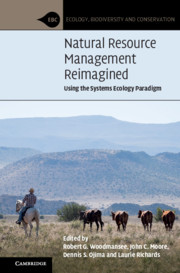Book contents
- Natural Resource Management Reimagined
- Ecology, Biodiversity and Conservation
- Natural Resource Management Reimagined
- Copyright page
- Contents
- Contributors
- Preface
- 1 The Systems Ecology Paradigm
- 2 Environmental and Natural Resource Challenges in the Twenty-First Century
- 3 Evolution of Ecosystem Science to Advance Science and Society in the Twenty-First Century
- 4 Five Decades of Modeling Supporting the Systems Ecology Paradigm
- 5 Advances in Technology Supporting the Systems Ecology Paradigm
- 6 Emergence of Cross-Scale Structural and Functional Processes in Ecosystem Science
- 7 Evolution of the Systems Ecology Paradigm in Managing Ecosystems
- 8 Land/Atmosphere/Water Interactions
- 9 Humans in Ecosystems
- 10 A Systems Ecology Approach for Community-Based Decision Making
- 11 Environmental Literacy
- 12 Organizational and Administrative Challenges and Innovations
- 13 Where to From Here? Unraveling Wicked Problems
- Index
- References
6 - Emergence of Cross-Scale Structural and Functional Processes in Ecosystem Science
Published online by Cambridge University Press: 25 February 2021
- Natural Resource Management Reimagined
- Ecology, Biodiversity and Conservation
- Natural Resource Management Reimagined
- Copyright page
- Contents
- Contributors
- Preface
- 1 The Systems Ecology Paradigm
- 2 Environmental and Natural Resource Challenges in the Twenty-First Century
- 3 Evolution of Ecosystem Science to Advance Science and Society in the Twenty-First Century
- 4 Five Decades of Modeling Supporting the Systems Ecology Paradigm
- 5 Advances in Technology Supporting the Systems Ecology Paradigm
- 6 Emergence of Cross-Scale Structural and Functional Processes in Ecosystem Science
- 7 Evolution of the Systems Ecology Paradigm in Managing Ecosystems
- 8 Land/Atmosphere/Water Interactions
- 9 Humans in Ecosystems
- 10 A Systems Ecology Approach for Community-Based Decision Making
- 11 Environmental Literacy
- 12 Organizational and Administrative Challenges and Innovations
- 13 Where to From Here? Unraveling Wicked Problems
- Index
- References
Summary
Fundamental knowledge about the processes that control the functioning of the biophysical workings of ecosystems has expanded exponentially since the late 1960s. Scientists, then, had only primitive knowledge about C, N, P, S, and H2O cycles; plant, animal, and soil microbialinteractions and dynamics; and land, atmosphere, and water interactions. With the advent of systems ecology paradigm (SEP) and the explosion of technologies supporting field and laboratory research, scientists throughout the world were able to assemble the knowledge base known today as ecosystem science. This chapter describes, through the eyes of scientists associated with the Natural Resource Ecology Laboratory (NREL) at Colorado State University (CSU), the evolution of the SEP in discovering how biophysical systems at small scales (ecological sites, landscapes) function as systems. The NREL and CSU are epicenters of the development of ecosystem science. Later, that knowledge, including humans as components of ecosystems, has been applied to small regions, regions, and the globe. Many research results that have formed the foundation for ecosystem science and management of natural resources, terrestrial environments, and its waters are described in this chapter. Throughout are direct and implicit references to the vital collaborations with the global network of ecosystem scientists.
Keywords
- Type
- Chapter
- Information
- Natural Resource Management ReimaginedUsing the Systems Ecology Paradigm, pp. 140 - 201Publisher: Cambridge University PressPrint publication year: 2021

